Iranian Military Commanders Blame ‘Enemies’ For Uprising
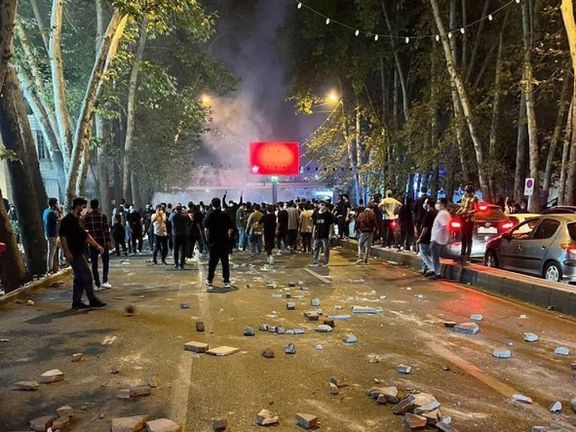
As the protests in Iran enters its sixth week with no sign of abating, Iranian military brass continued to blame the protests on Western enemies.

As the protests in Iran enters its sixth week with no sign of abating, Iranian military brass continued to blame the protests on Western enemies.
Commander-in-Chief of Iran’s traditional Army Abdolrahim Mousavi said on Friday that the United States and Israel seek to sow discord among different generations and ethnic groups.
“Seduction of the youth and discord between generations, ethnic groups, guilds and unions, political parties, classes of society, religions and sects, are the plots designed by the think tanks and research centers of the American and Zionist regime's intelligence apparatuses,” he said.
People from all the groups he mentioned have been holding protests or strikes against the clerical regime since 2017. A stronger and more enduring round of protests began in mid-September when Iran’s hijab police killed a 22-year-old woman. Mostly young demonstrators demand an end to the Islamic Republic and a democratic, secular government.
Ali Fadavi, the second highest commander in the Revolutionary Guard, said on Friday that the country’s ‘enemies’ that used to focus on ‘hard war’ against the Islamic Republic in the last decades have now adopted a hybrid approach, combined with soft power. He said popular art can be used to promote the Islamic Republic revolutionary ideology.
IRGC’s Aerospace Force Commander Amir Ali Hajizadeh also said on Friday, “We need to do creative and innovative works in the field of culture,” adding that “We have not done anything serious to celebrate and create a fresh and cheerful environment.”

The FBI has warned that the Iranian cyber group Emennet Pasargad is conducting hack-and-leak operations involving a combination of hacking and theft of data.
In a statement released on Thursday, the US agency said that since at least 2020 the group targeted entities primarily in Israel with cyber-enabled information operations that included an initial intrusion, theft and subsequent leak of data followed by amplification through social media and online forums, and in some cases the deployment of destructive encryption malware.
The FBI added that the Iranian group used false-flag campaigns under the guise of multiple personas like hacktivist or cyber-criminal groups. The company, previously known as Eeleyanet Gostar and Net Peygard Samavat, has regularly rebranded to evade US sanctions
The FBI added that the group’s techniques may be used to target US entities, as was the case during their cyber-enabled information operation to attack the 2020 US Presidential election. Saying that the FBI has identified a destructive cyberattack against a US organization, it underlined that the group remains a threat to the US.
On Wednesday, October 19, the US State Department announced a $10-million reward for information about the group’s operations or its members.
Back in February, the US offered up to $10 million for information leading to the arrest of two of the group's members for trying to influence and interfere with the 2020 presidential election.
In November 2021, the Treasury Department sanctioned six Iranian officials as well as the company for their involvement in the planned cyberattack.
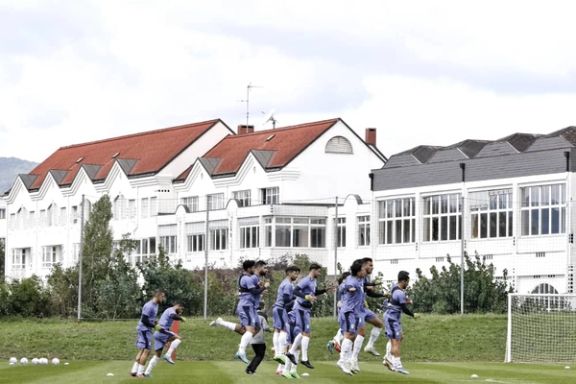
A group of Iranian sports personalities and lawyers have requested world football governing body FIFA to eliminate Islamic Republic’s team from the World Cup.
Iranian activist Masih Alinejad released a document on Wednesday, showing the legal request sent to the FIFA Council to ban Iran from the upcoming World Cup slated to start in Qatar on November 20.
She said that the move aimed at suspending the Islamic Republic from attending international sport events was sponsored by a group of lawyers critical of the regime, adding that “a murderous regime and its officials should not be able to freely participate in international events.”
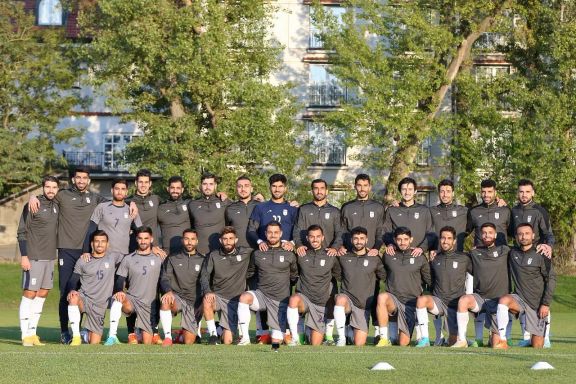
“Iran's brutality and belligerence towards its own people has reached a tipping point, demanding an unequivocal and firm disassociation from the footballing and sports world. FIFA's historical abstinence from political quagmires has often only been tolerated when those situations do not metastasize into the footballing sphere," read the document. “The situation for women in Iran is deeply unpalatable in the broader political and socio-economic framework.”
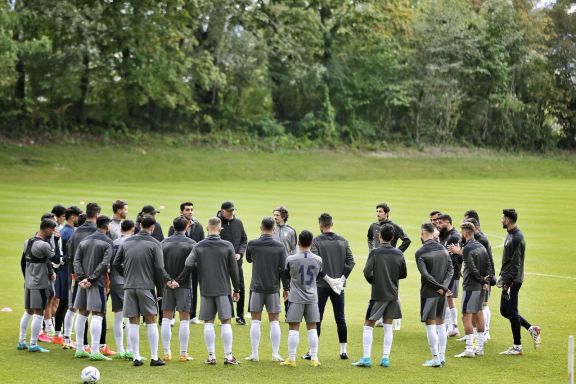
The lawyers argued that if women are not allowed into stadiums across the country, and the Iranian Football Federation is simply following and enforcing governmental guidelines; they cannot be seen as an ‘independent’ organization and free from any form or kind of political influence, describing it as “a violation of (Article 19) of FIFA's statutes,” according to which the FIFA Council is statutorily empowered to take drastic immediate action and immediately suspend Iran.
“If, however, FIFA thinks that the Iranian Football Association is not under the influence of its government, and is acting solely as an independent organization, then forbidding all women from entering stadiums and participating in the World Cup violates Articles 3 and 4 of FIFA Statutes,” in which FIFA has committed itself to respect and protect human rights internationally.
“The FIFA World Cup is a celebration of international solidarity and peace. FIFA shouldn't allow participation by a country that is actively persecuting its women, athletes and children only for their exercising their most basic human rights,” the document concluded.
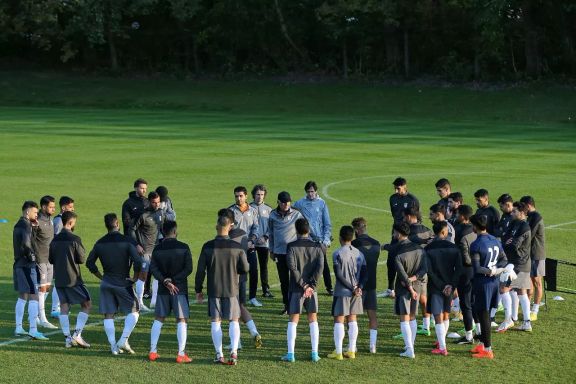
British member of parliament Chris Bryant, the chair of the All-Party Parliamentary Group on Russia and former Foreign Office minister, said earlier in the week that FIFA should stop Iran from participating in the World Cup for its supply of weaponry for the Russian invasion of Ukraine.
Since March, many Iranians themselves have been urging FIFA to ban Team Melli from the World Cup for forcibly barring women from entering stadiums to watch matches. Under FIFA pressure, Iranian authorities started to let in a cherrypicked group for women so they would not face bans and penalties. However, since the start of the current uprising across Iran and a lackluster support from the national squad, the calls on FIFA to ban Iran have become stronger.

Protests in Iran continued on Thursday with the northwestern city of Tabriz being the hotbed of unrest, with additional security forces deployed in the key city.
Protests continued on Thursday in the capital Tehran as well as several other cities such as Rasht, Karaj, Mahabad and Esfahan, while workers of numerous oil, gas, petrochemical, pipe mills, sugar cane, and tire factories have been holding strikes.
Social media videos showed several bouts of violent clashes between the citizens of the Azari majority city of Tabriz, the capital of East Azarbaijan province, with people setting up fires and chanting slogans such as "Death to Dictator," referring to the Islamic Republic’s ruler Ali Khamenei.
According to reports, Internet access was shut down in Tabriz while in some areas even the mobile phone network was out of service. People were on the streets demonstrating well into the night.
The city of Marivan, in Kordestan province, was also a scene of protest rallies with many young women unveiling in public and chanting antigovernment protests.
The US-based Iranian Human Rights Activists News Agency (HRANA) reported on Thursday that at least 12,500 people have been detained in Iran, adding that at least 244 people, including 32 children, were also killed.
The group calling itself the Youth of Tehran’s Neighborhoods has mobilized thousands of protesters in several towns and cities through social media at a time of serious internet disruptions. Their latest call for protests was released on Wednesday for nationwide rallies on Saturday, October 22.
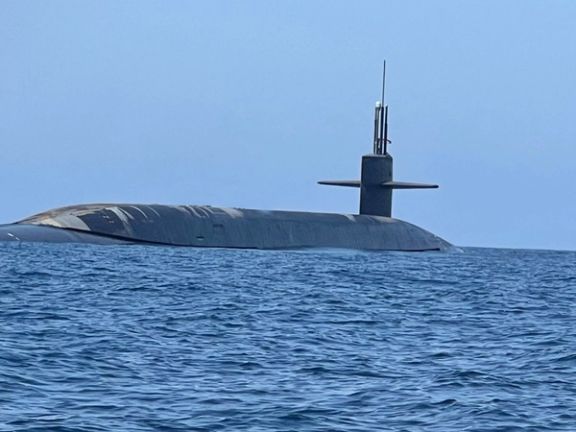
The US military made an unusual disclosure Wednesday, revealing the location of its submerged nuclear-powered ballistic missile submarines in the Arabian Sea near Iran’s waters.
In a move likely to make waves across the region, the US Central Command (CENTCOM) released photos showing its commander General Michael “Erik” Kurilla onboard the west Virginia. It has been described as a rare decision, as the US military seldom, if ever, acknowledges where its ballistic missile subs are operating, particularly when they are stationed near an adversary's shores.
Praising the submarine and its crew, Kurilla called the vessel “the crown jewel of the nuclear triad,” and said that “The West Virginia demonstrates the flexibility, survivability, readiness, and capability of USCENTCOM and USSTRATCOM forces at sea.”
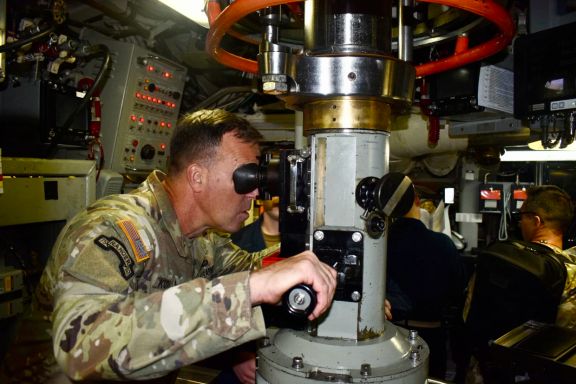
Kurilla's visit may be seen as sending a message to US adversaries in the region, including the Islamic Republic, of Washington's capabilities, including submarines that can carry up to 20 ballistic missiles with multiple warheads.
In June, US officials said attacks by Iranian proxies against bases housing American military personnel in Iraq and Syria were increasing. In August, the US military carried out retaliatory air strikes in Syria against facilities used by groups affiliated with Iran's Revolutionary Guards Corps (IRGC).
Late August, the US Navy prevented an IRGC navy support ship from capturing an unmanned vessel operated by the US 5th Fleet in the Persian Gulf.

The US-based Iranian Human Rights Activists News Agency (HRANA) reported on Thursday that at least 12,500 people have been detained in Iran, adding that at least 244 people, including 32 children, were also killed.
Reports from Iran also indicate that despite widespread arrests among striking workers in the oil and gas industry and young protesters on streets, the uprising in Iran shows no sign of abating.
According to reports, several managers of Iran’s refineries and factories whose workers have been on strike since at least a week ago were arrested on Thursday, making the number of detained striking employees to well over 100.
A large number of journalists and activists have also been arrested since the beginning of the uprising, ignited by the death of 22-year-old Mahsa Amini in custody of hijab police last month.
Every day, more workers are joining the strikes which have been gaining momentum since last week as Iran’s antigovernment protest movement has entered its second month.
Earlier on Thursday, the Union of Truck Drivers announced that in support of the protests, they will not work on their trucks on Friday and will stop transportation activities.
On October 18, the workers of Haft-Tappeh Sugarcane complex in the southwestern Khuzestan province joined the strikes in oil, gas, and petrochemical sectors in southern Iran.
Workers of several phases of South Pars Gas-Condensate field, Bushehr Petrochemical Company and Hengam Petrochemical Company -- both of which operate at Asalouyeh Complex -- Abadan Petrochemical company and refinery, Mahshahr’s refinery and Pipe Mill Plant, as well as Neyriz Ghadir Steel Complex off the coasts of the Persian Gulf have been on strikes in solidarity with the protests across Iran.